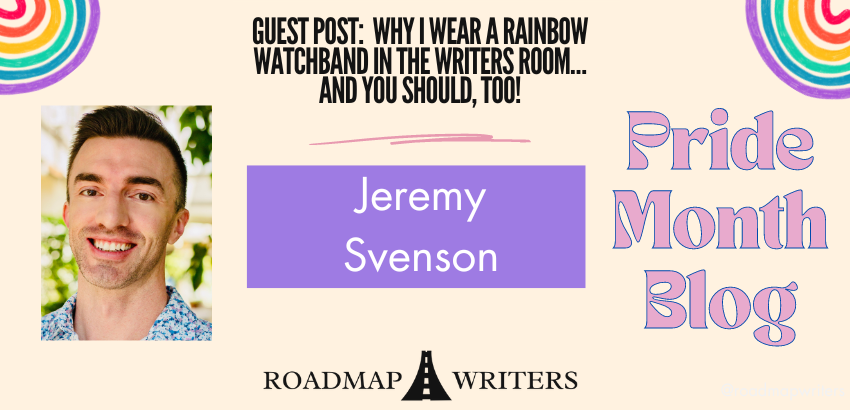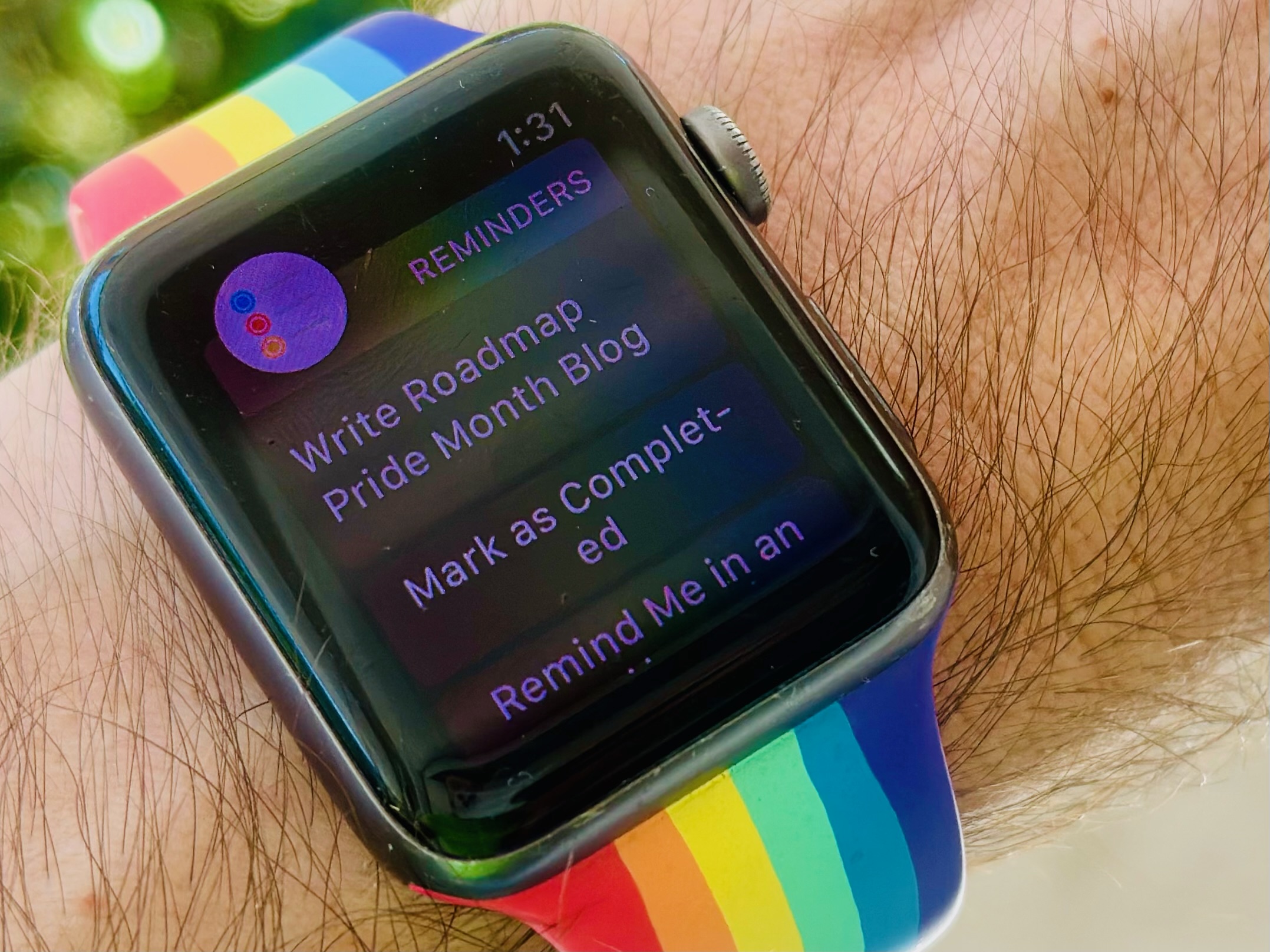
For this Pride Month Blog, Jeremy Svenson shares how a rainbow watchband allowed him to openly embrace his queer identity in the Writer's Room.
Happy LGBTQ+ Pride Month from this out-and-proud television writer! But the truth is, I haven’t always been this “out” or “proud”…
Blending In
I was born a cisgender white male who some might call “straight-passing,” which means that the decision of whether or not to “come out” in a new setting is something I’ve usually had control over. Coming up the assistant track in the business of TV writing, with ever-changing staffs and shows, “new settings” have been a pretty regular part of my career.
In many ways, that control has been a privilege, allowing me the physical and emotional safety to blend in amongst “the straights,” whether I’m filling up my car at some MAGA-decorated gas station in Fresno or starting in a new writers room with people I’ve never met. So why — I’ve been asked — would I give all that up by choosing to wear a rainbow pride watchband?

Jeremy Svenson's Rainbow Watchband
Because for me, “blending in” and “fitting in” are not the same thing, and when it comes to a writers room, I would rather fit in, even at the cost of blending in… though I didn’t always feel that way. Over nearly two decades in this business, my personal feelings about “coming out” at work have changed more frequently than streaming service mandates.
In the early days as a scrawny gay assistant, I chose to remain in the closet. I had a personal “rule” to never lie about my sexuality but instead censor myself so thoroughly as to reveal nothing personal — or, indeed, interesting — about my life at all. If some well-meaning coworker asked what I did over the weekend, I’d give a generic answer like, “just hung out with a friend,” rather than the full truth: that I saw Wicked at the Pantages with my boyfriend and spent the rest of the weekend perfecting our duet of “For Good” on his karaoke machine. My rule may have helped me “blend in,” but shrouding every personal detail about oneself is no way to “fit in.”
New Rules
To remedy this, at my next job I came up with a new “rule:" If asked, I would answer any question about my life outside of the office fully. I still wasn’t interested in leading a conversation by outing myself, but I wasn’t going to avoid it any more either. I was coming out for me, and it felt pretty good… most of the time.
Here, I should mention that I’ve been incredibly lucky that I’ve never encountered overt homophobia in my career — I know many writers who haven’t been so fortunate. But what I have encountered in nearly every workplace is casual homophobia, often in the form of gay jokes directed at no one in particular.
The problem with my latest rule was that sometimes the opportunity to “out myself” through natural conversation wouldn’t arise for days, if not weeks, at a new job. That meant that by the time everyone found out I was gay, there were usually one or two people who suddenly felt very sheepish about something they previously said when they thought they were in strictly hetero-company. And when you’re an assistant in the TV business, the last thing you want is for a writer who’s in a position to possibly help your career to suddenly feel uncomfortable around you because they’re afraid you think they’re a big ol’ bigot.
Coming Out
So it was time for a new “rule”: When starting a new job, I’d find a way to out myself as soon as possible. And so I found ways of doing that without making it seem like I was intentionally doing that, such as: “Oh, thank god there’s coffee! My boyfriend drank the last cup at home this morning.” And it worked! I started outing myself before anyone had a chance to say something homophobic they’d later regret. But after awhile, forcing myself to come out so that I could spare someone else the discomfort of facing their own unconscious bias became something I was less than proud of.
But then something amazing happened. I got a job on a show where I was no longer the only queer writer in the room. For the first time, people were coming out to me, and it changed everything! The onus I’d placed on myself to come out as soon as possible was lifted. Through their openness, these other writers created a safe space for me to be myself… but that’s not all they did. As upper-level writers (or at least more “upper” than I was at the time), they helped me understand that being a gay man isn’t just a detail of my life… it’s an asset to my craft. They created an onramp for me to share my lived experience with the room in order to bring authenticity and perspective to the writing of our show.
The Rainbow Watchband
It was from that experience that I decided I’d start wearing a rainbow watchband whenever I began a new job — my latest coming out “rule” that I’ve had for many years now. Because the band does so much more than just signal my identity, it signals to other queer writers and assistants, whether in or out of the closet, that they’re in a safe space to be themselves, too. Not bad for a little strip of plastic.
But I saved the best thing about the rainbow watchband for last: You don’t actually need to be queer to wear one! Or to have an LGBTQ+ sticker, pin, or flag somewhere in your writers room. Allies are very much welcome to our colorful accoutrement! Because if everyone on a staff can do something to empower the full and honest expression of those around them, it will create better writers, better writing, and better shows. And that’s something we can all be proud of.
_____________________________________________________________________________
Thanks to Jeremy for sharing his journey as a queer writer. To hear from more in the LGTBQ+ Community, check out Roadmap Writer's Pride Month Panel which included queer writers, managers, and execs.